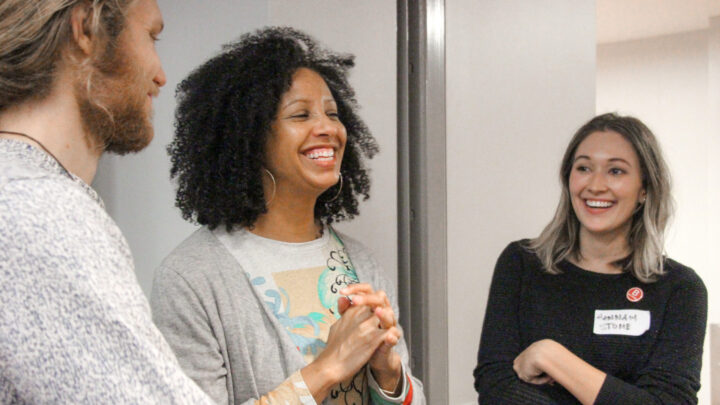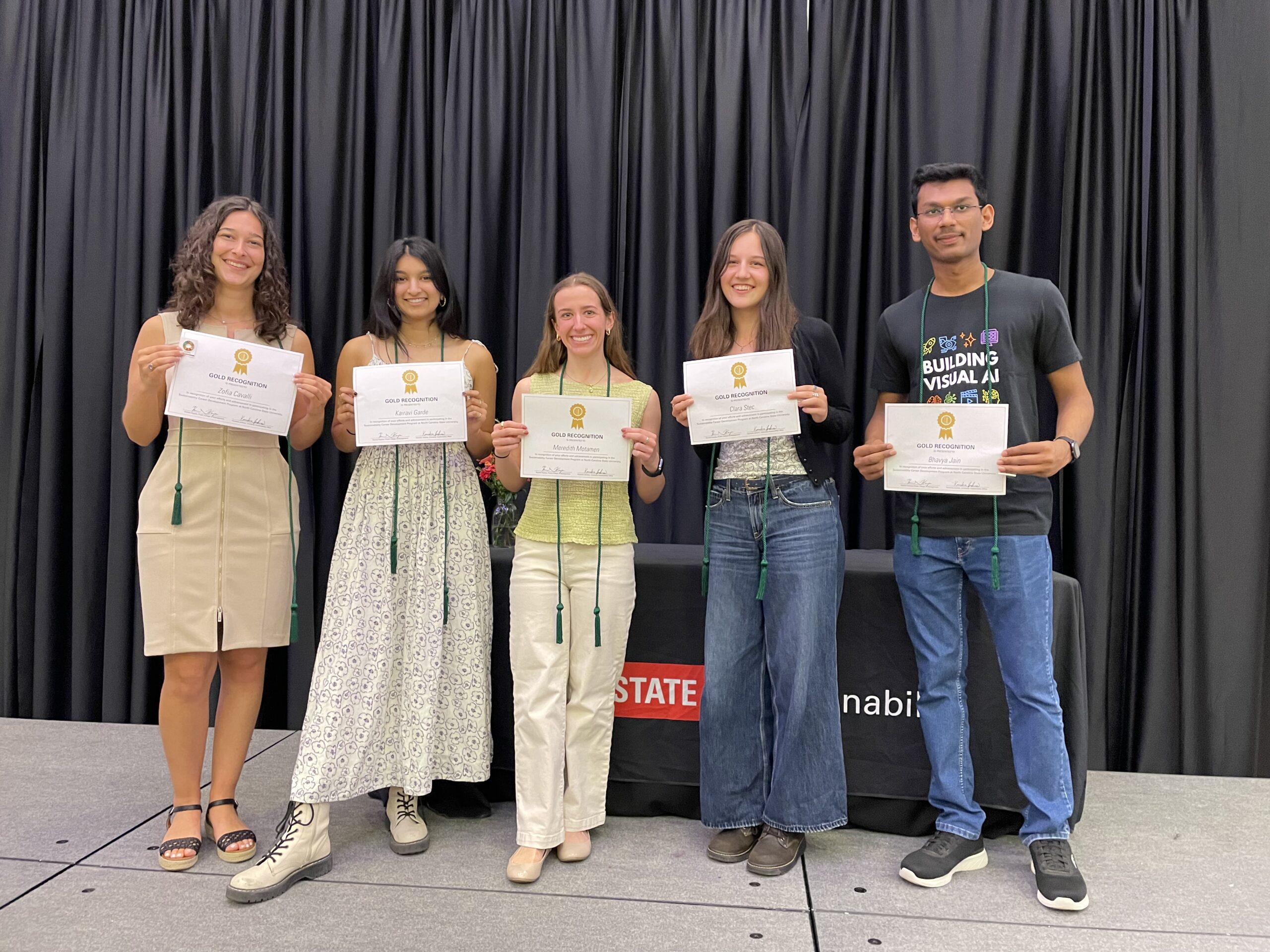Students from Across NC Participate in 2017 Spring B Corp Clinic
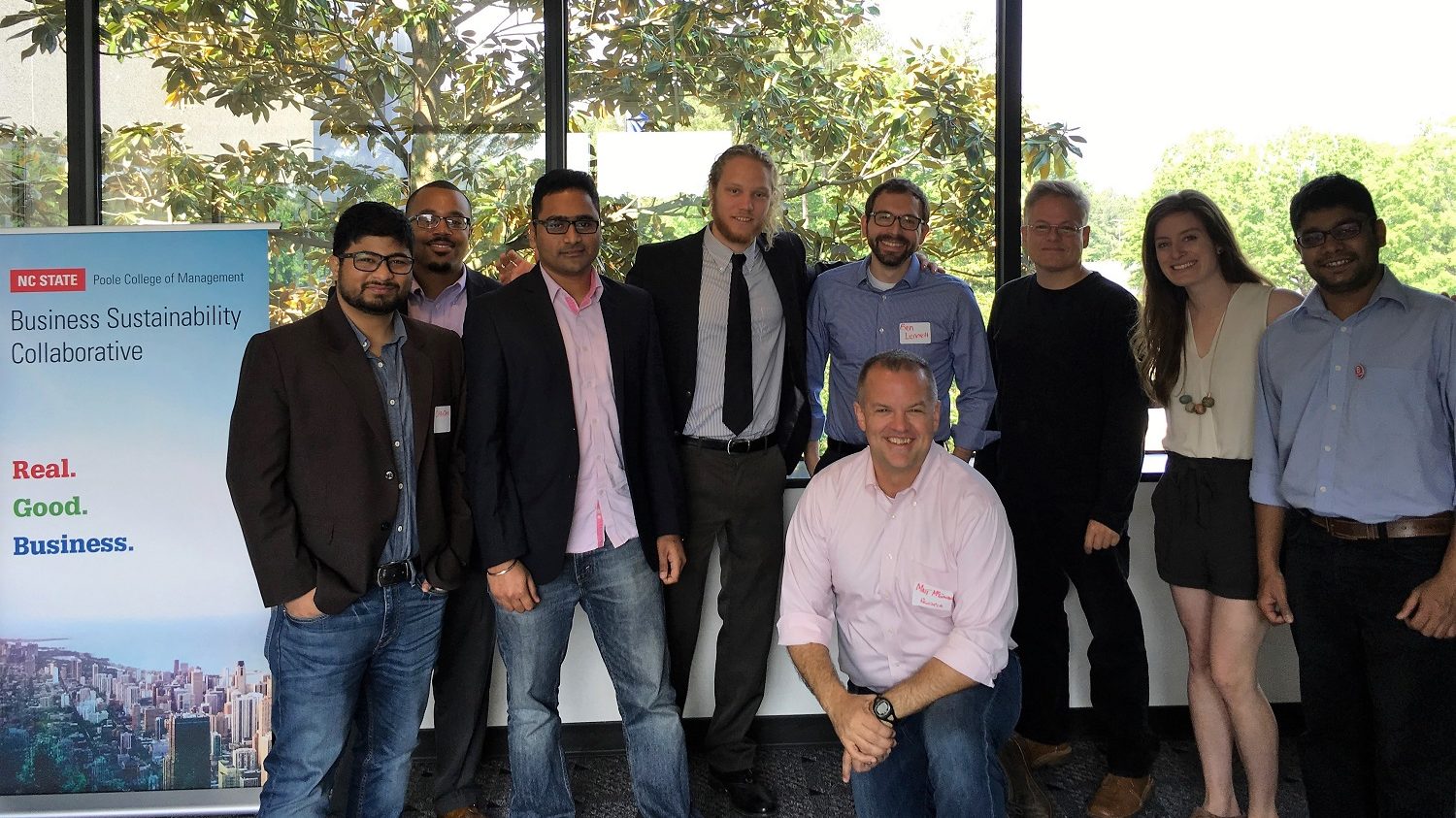
By Iman Usmani, BSC Associate
NC State’s B Corp Clinic provides an opportunity for students to work with local companies to improve their environmental and social impact. As part of the semester-long program, students teams use the B Impact Assessment to evaluate company’s impact on workers, environment, community and customers. Clinic teams use the assessment and their knowledge of sustainable business to provide local companies with recommendations on how to improve their B Impact Assessment score and strengthen their business model. Over the last two years, the B Corp Clinic has engaged 115 students and helped 22 certified and aspiring B Corp companies make progress on the BIA as well as track their business impact.
This year’s B Corp Clinic is another successful addition to the growing Business Sustainability Collaborative’s list of programs. Over 50 undergraduate and graduate students participated this Spring from NC State, Chapel Hill, Duke University, Elon University, Appalachian University and Wake Tech Community College. From measuring GHG emissions to designing diversity initiatives, students developed impactful, sustainable solutions in partnership with local companies. The final presentations took place at The Frontier, where each group took their turn in presenting the progress they made this semester while also giving their recommendations to their respective companies.
Get Involved
Learn more about the Spring 2017 B Corp Clinic projects below. Contact Jessica Thomas (jothomas@ncsu.edu) if you’re interested in particing in the Fall 2017 B Corp Clinic where there will be an opportunity for NC State students to receive credit for their participation.
Broughton Consulting
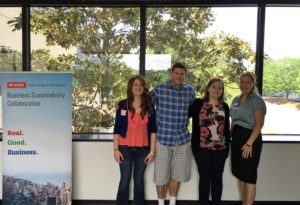
Broughton Consulting is a company that is focused on fostering employee relationships through “open book mangement.” The company works on employee engagement in the workplace. Prior to any work being done by the B Corp Clinic group, the company scored a total of 78.8 points on the B Impact Assessment, scoring the most points in the community section. The group used the assessment taken as a way to determine where to improve the company’s social and environmental impact. They dedided to work on the employee handbook, process and procedures manual and the company’s environmental impact by tracking the greenhouse gas emissions. Overall, the group resubmitted the assessment and brought Broughton up to 99 points, well about the 80 points needed for certification. Broughton Consulting is now a Certifed B Corporation.
Broughton Consulting team (left to right): Jennifer Jones, Microbiology Graduate Program at Univeristy of North Carolina (Team Lead), Mariela Kriebel, Fuqua School of Business at Duke University, Katie Kross, Fuqua School of Business at Duke University (Team Coach).
Vital Plan
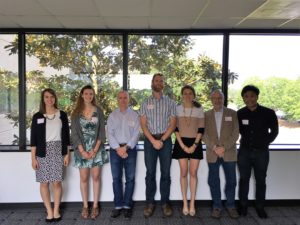 Vital Plan is a North Carolina-based startup that offers natural supplements, guided online wellness courses and personalized coaching. A team of students worked with Vital Plan to fulfill their commitment to the B Corp Inclusion Challenge, an initiative that invited every B Corp to set goals and improve on three or more inclusion metrics in the B Impact Assessment. The group spent their semester working with the company to improve their family and medical leave policy, create trainings addressing worker bias and develop a recruitment strategy to attract a more diverse workforce.
Vital Plan is a North Carolina-based startup that offers natural supplements, guided online wellness courses and personalized coaching. A team of students worked with Vital Plan to fulfill their commitment to the B Corp Inclusion Challenge, an initiative that invited every B Corp to set goals and improve on three or more inclusion metrics in the B Impact Assessment. The group spent their semester working with the company to improve their family and medical leave policy, create trainings addressing worker bias and develop a recruitment strategy to attract a more diverse workforce.
Vital Plan team (left to right): Mallory Alman, College of Engineering at NC State, Hannah Taylor, International Studies at NC State University, Jim Noonan, company representative of Vital Plan, Olivia Eskew, Nicholas School of Environment at Duke University, David Machles, OHS Dimensions, Team Coach, and Wasan Chaijedsarid, Fuqua MBA at Duke University (Team Lead)
The Redwoods Group
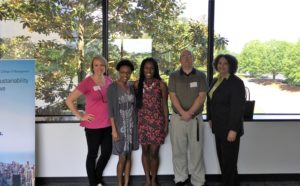 The Redwoods Group is already a certified B Corp insurance company that faced reevaluation of the assessment this year. The company “changed the traditional insurance model so that [their] everyday work can help change lives.” The group decided to focus on environment, diversity and inclusion as points of improvement for the company. Just from the changes in the assessment since the company last took it, The Redwoods Group received 10 additional points to their already-certification worthy score, to a score of 106. The group of undergraduate and graduate students, led by Katie Gailes of Wake Tech, faced some challenges such as establishing which points were possible to obtain and the difficulty that came with having no board of directors to consult. All in all, the group helped the score of the Redwoods Group, which is now on the road to 160 points.
The Redwoods Group is already a certified B Corp insurance company that faced reevaluation of the assessment this year. The company “changed the traditional insurance model so that [their] everyday work can help change lives.” The group decided to focus on environment, diversity and inclusion as points of improvement for the company. Just from the changes in the assessment since the company last took it, The Redwoods Group received 10 additional points to their already-certification worthy score, to a score of 106. The group of undergraduate and graduate students, led by Katie Gailes of Wake Tech, faced some challenges such as establishing which points were possible to obtain and the difficulty that came with having no board of directors to consult. All in all, the group helped the score of the Redwoods Group, which is now on the road to 160 points.
Redwoods Team (lef to right): Paige Bagwell, Chief Talent Officer at Redwoods (Company Representative), Taylor Price, Nicholas School of Environment at Duke University, Sydney Harrs, MSBA at Elon University, Charles Robison, M.A. at Appalachian State, Katie Gailes of Wake Tech Community College (Team Coach).
Galuku
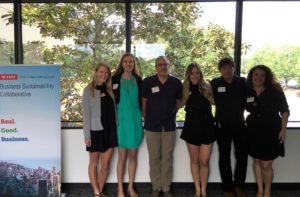 Galuku, an Australia-based multinational that develops products made with coconut husks for multiple industries including horticulture and hydroponics. The Clinic team explored quantifying the impact of the company’s complex supply chain by developing a supplier code of conduct and a supplier survey. They also worked with the company to measure energy and GHG emissions as well as put an energy-saving plan in place.
Galuku, an Australia-based multinational that develops products made with coconut husks for multiple industries including horticulture and hydroponics. The Clinic team explored quantifying the impact of the company’s complex supply chain by developing a supplier code of conduct and a supplier survey. They also worked with the company to measure energy and GHG emissions as well as put an energy-saving plan in place.
Galuku Team (left to right): Tali Brennan, Nicholas School of Environment at Duke University, Jourdan Blackwell, Nicholas School of Environment at Duke University, Steve Gilbert, Murphy’s Naturals (Team Coach), Emily True, Nicholas School of Environment at Duke University, Isshu Kikuma, Nicholas School of Environment at Duke University, Hunter Smith, Sustainable Materials at NC State
Red Hat
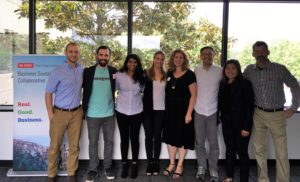 Red Hat, a North Carolina-based open source technology company with over 9,000 employees worldwide. Clinic students explored how B Corp certification aligned with the company’s culture and brand. They worked with representatives from across Red Hat to gather documentation in order to develop a baseline B Impact Assessment score. Students also evaluated strategies for improving Red Hat’s BIA score and developed a pitch to make the case to Red Hat leadership on the value of B Corp certification.
Red Hat, a North Carolina-based open source technology company with over 9,000 employees worldwide. Clinic students explored how B Corp certification aligned with the company’s culture and brand. They worked with representatives from across Red Hat to gather documentation in order to develop a baseline B Impact Assessment score. Students also evaluated strategies for improving Red Hat’s BIA score and developed a pitch to make the case to Red Hat leadership on the value of B Corp certification.
Red Hat Team (left to right): Ben Bradley, Jenkins MBA at NC State (Team Lead), Ryan Roth, Jenkins MBA at NC State, Swathi Krothapalli, Poole College of Management at NC State, Scott Johnsen, Martha and Spencer Love School of Business at Elon University, Emilia Hull, Fuqua School of Business at Duke University, Amy Zheng, College of Arts and Sciences at Elon University, Chris Lawrence (Team Coach)
Protopia
 Protopia is a new company as well as an aspiring B Corporation. The company is focused on an “advice sharing solution [that] delivers results for a wide range of networks.” The company works on giving advice within the community, and, for this reason, they will potentially score the most points in the section for community and governance. Since the corporation is less than 12 months old, they are considered to be in pending B Corp status. The group, led by their mentor, Liz Tracy, took the company from 48.6 points to 101.7, mainly scoring points in governance and community. The group primarily focused on this category along with environmental impact and are planning on applying for B Corp certification in 2018.
Protopia is a new company as well as an aspiring B Corporation. The company is focused on an “advice sharing solution [that] delivers results for a wide range of networks.” The company works on giving advice within the community, and, for this reason, they will potentially score the most points in the section for community and governance. Since the corporation is less than 12 months old, they are considered to be in pending B Corp status. The group, led by their mentor, Liz Tracy, took the company from 48.6 points to 101.7, mainly scoring points in governance and community. The group primarily focused on this category along with environmental impact and are planning on applying for B Corp certification in 2018.
Protopia Team (left to right): Chandan Dash, Jenkins MBA at NC State, David Saterfield, Jenkins MBA at NC State, Rudhawarsh Loganathan, Jenkins MBA at NC State (Team Lead), Jordan Bowman,Wake Tech, Benjamin Lennett, Jenkins MBA at NC State, Matt McGowna and Max Leisten, Company Representative at Protopia, Liz Tracy, HQ Raleigh (Team Coach), Krishnan Narayan, Jenkins MBA at NC State
Broadreach
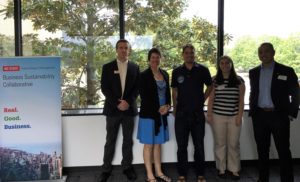 Broadreach is a company that creates summer opportunities for youth, including college students and teenagers. The group recognized that the company needed the most help in the governance and community sections of the assessment, so they focused their energy towards these areas. The group also created a system for tracking the water usage of the company and are looking for user assessment feedback to help improve the company’s score in these sections. The group ended with a road map for Broadreach to increase their points in the future.
Broadreach is a company that creates summer opportunities for youth, including college students and teenagers. The group recognized that the company needed the most help in the governance and community sections of the assessment, so they focused their energy towards these areas. The group also created a system for tracking the water usage of the company and are looking for user assessment feedback to help improve the company’s score in these sections. The group ended with a road map for Broadreach to increase their points in the future.
Broadreach Team (left to right): Joseph Moss, Nicholas School of Environment of Duke University, Jessica Steinberg, Fuqua School of Business at Duke University, Bobbi Lesser, Nicholas School of Environment at Duke University, Adam Harris, Jenkins MBA at NC State (Team Lead)
R+M Agency
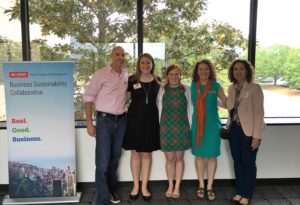
Last up was the R+M agency which is a marketing company that is already a certified B Corporation. The group consisted of 6 students, who focused on helping R+M improve their score within the assessment. The group did this by focusing on the company’s scores in community and environment. The group created ways to increase volunteerism within the company by introducing a pay system for employees to volunteer. The team helped the agency increase their BIA by 4 points to 97.1 points. The B Corp Clinic experience proved to be useful for the company representative, Greg Norton. Norton believed the diverse group that his company was assigned to allowed the company to see its challenges in a new way.
R+M Agency Team (left to right): Greg Norton, R+M Agency (Company Representative), Meghan Greene, Love School of Business at Elon University, Gabrielle Corner, Marketing at Elon University, Larissa Via, Jenkins MBA at NC State (Team Lead), Beth Ritter, NC State Poole College (Team Coach)
Overall, the Spring 2017 B Corp Clinic proved to be a diverse group of companies and students who worked together for each individual case. According to Harris, team lead on the Broadreach project, he “was impressed at the scope and depth of the insights that each team generated throughout a semester’s worth of work.” Although there was a variety of business challenges that the groups faced, the Spring Clinic proved to be a way for companies to reevaluate and improve their social and environmental impact in every case.
- Categories:
